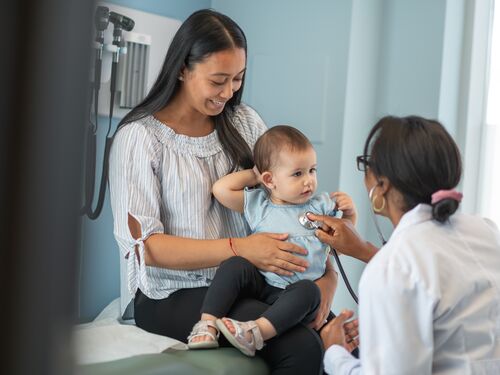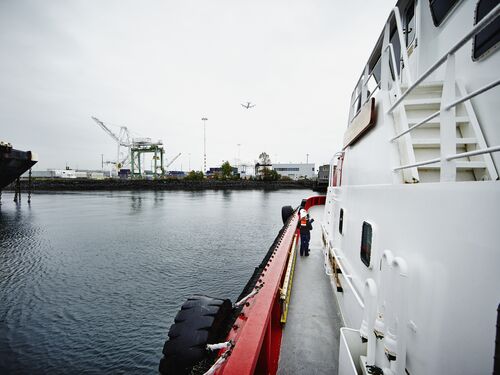Eighteen Ukrainian Research Projects Selected for Long-Term Funding by the Polish Academy of Sciences and U.S. National Academy of Sciences
News Release
Last update June 29, 2023
WASHINGTON — The Polish Academy of Sciences (PAS) and the U.S. National Academy of Sciences (NAS) have selected 18 Ukrainian research teams across various scientific disciplines to receive financial support of up to approximately $200,000 USD per year for up to three years — a total of approximately $8 million USD (33 million PLN). The goal of the funding is to provide outstanding Ukrainian scientists with stable conditions for conducting research that, in the future, will lead to rebuilding science in Ukraine. Financial support for the grants is also being provided by the Royal Society of the U.K., Elsevier, the National Cheng Kung University of Taiwan, the German National Academy of Sciences Leopoldina, and the Royal Swedish Academy of Letters, History and Antiquities.
Selected from among 174 applications, the 18 grant recipients are working in the following scientific disciplines: astronomy, environmental sciences, mathematics, psychology, materials sciences and engineering, agriculture, biomedical sciences, physics, and chemistry. Eight of the 18 research teams are led by women. The recipients will discuss their research at a June 29 event in Warsaw, which will also feature U.S. Ambassador to Poland Mark Brzezinski and leaders of several international science academies.
Independence, stability, and double affiliation
The Ukrainian research teams will conduct their work in scientific units of the Polish Academy of Sciences. The principal investigator will remain in Poland for the duration of the project, while the other members may conduct research both in Poland and in Ukraine. Participation in the implementation of research projects under the affiliation of scientific units of the Polish Academy of Sciences assumes that scholars from Ukraine will keep their affiliation with Ukrainian institutions.
Details of the projects selected can be found in the table below (listed alphabetically by the principal investigator’s name).
Principal Investigator
Host PAS unit
Title of the research project
Bertsyk, Peter
Nicolaus Copernicus Astronomical Centre
Formation and evolution of the Nuclear Star Cluster in the Milky Way and other spiral galaxies on the cosmological time scale
Bondar, Kseniia
Institute of Geophysics
Quantifying magnetic properties of soils to evaluate sustainable hazards from heavy metal pollution due to military activities in Ukraine
Borodina, Olena
Institute of Rural and Agricultural Development
Substantiation and measures for implementation of a human rights-based integrated approach to rural development, food security and land policy in post-war rebuilding of Ukraine
Cherkas, Volodymyr
Institute of Bioorganic Chemistry
Nanoscale hippocalcin signaling in long-term depression in norm and primary dystonia
Dovbeshko, Galyna
Institute of Low Temperature and Structure Research
War-derived air pollution nanohybrids composed of carbon containing smoke nanoparticles and metal compounds: FIR/Raman spectroscopic, fluorescent, and membrane-active properties, their potential neurotoxicity, and its prevention
Dudko, Artem
Institute of Mathematics
Ergodic group actions, characters on groups and unitary representations
Dudnyk, Oleksii
Space Research Centre
The study of solar flares and their manifestation during 25th cycle of solar activity by using the Solar Orbiter and ground radio scientific database
Goncharuk, Olena
Institute of Agrophysics
Biocompatible hybrid hydrogels with functional inorganic fillers for strengthening of plant vegetation
Kochelap, Viacheslav
Institute of High Pressure Physics
Device focused research of amplification, generation, and control of terahertz radiation
Kudrynskyi, Zakhar
Institute of Physics
Probing charge-, phonon- and spin-quanta in novel two-dimensional van der Waals semiconductors: From fundamentals to applications
Kyrychenko, Anhelina
Institute of Biochemistry and Biophysics
Experimental evaluation of virus disease of cereals in Ukraine and liposomal bionanotechnology for crop stabilization
Naydonova, Lyubov
Institute of Psychology
War mental health crisis coping: Evidence-based media psychoeducation for family and community health promotion during economic recovery
Poliarus, Olena
Institute of Metallurgy and Material Sciences
Development of new MMCs coating based on NiAl, NiTi intermetallic matrix reinforced with high entropy nitrides (Cr, Zr, Nb, Al., Ti)N
Potopnyk, Mykhailo
Institute of Organic Chemistry
Organoboron materials capable of harvesting triplet excitons for a new generation of optoelectronic devices
Sadovyi, Bohdan
Institute of High Pressure Physics
Influence of high N2 gas pressure on crystallization mechanisms and physical properties of h-BN
Sashuk, Volodymyr
Institute of Physical Chemistry
Ferroelectric nematic liquid crystal: A new paradigm for breakthrough electrooptical applications
Shayakhmetova, Ganna
Institute of Pharmacology
Long-term effects of fluoxetine on reproductive function and behavioral phenotype in a rodent model of juvenile post-traumatic stress disorder
Zalizovskyy, Andriy
Space Research Centre
Studying the geospace plasma irregularities for the needs of Space Weather operational services
“As the war in Ukraine wages on, disrupting science and diverting resources from research programs, supporting Ukrainian scientists and keeping them connected to the global scientific community is more crucial than ever,” said U.S. National Academy of Sciences President Marcia McNutt. “We are pleased to be able to help support these outstanding researchers so that they can continue to make important contributions to science and to the future of Ukraine.”
“The program offers tools and resources enabling outstanding Ukrainian research groups to carry out scientific projects. Planning this program, we aimed to consider, among other things, the dual affiliation of all team members and the possibility of conducting research in Ukraine. I am convinced that the work of these outstanding scientists will contribute to the development and reconstruction of science in Ukraine,” said Marek Konarzewski, president of the Polish Academy of Sciences.
The long-term grant program is the latest in a series of efforts to support scientists from Ukraine implemented by the Polish Academy of Sciences in cooperation with the NAS and external partners. The program builds on an earlier initiative begun just after the start of the war focused on providing individual support to researchers who left Ukraine. In 2022, a total of 218 Ukrainian researchers (82% of whom are women) benefitted from this support.
Contacts for Media:
Monika Chrobak
Polish Academy of Sciences
+48 22 182 66 02, 723 440 650
monika.chrobak@pan.pl
Molly Galvin
Office of News and Public Information
U.S. National Academies of Sciences, Engineering, and Medicine
+1 202 334 2138
news@nas.edu
More like this
Discover
Events
Right Now & Next Up
Stay in the loop with can’t-miss sessions, live events, and activities happening over the next two days.
NAS Building Guided Tours Available!
Participate in a one-hour guided tour of the historic National Academy of Sciences building, highlighting its distinctive architecture, renowned artwork, and the intersection of art, science, and culture.

